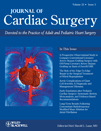Long-Term Results Following Concomitant Radiofrequency Modified Maze Ablation for Atrial Fibrillation
Conflict of interest: This paper has been presented to the Canadian Cardiovascular Society Meeting, Edmonton, October 2009. Drs. Maltais, Pagé, and Perrault are Scholars of Fonds de la Recherche en Santé du Québec (FRSQ). Drs. Pagé and Perrault are supported by the Department of Surgery, Université de Montréal. Data collection was partially supported by an unrestricted grant from Medtronic (Canada).
Abstract
Abstract Background and aim of study: This study evaluated the long-term outcome of linear, endocardial, radiofrequency (RF) atrial ablation for the treatment of atrial fibrillation (AF) concomitantly to open-heart procedures for acquired cardiac organic disease. Methods: A saline-irrigated “pen-like” RF ablation catheter (Cardioblate®, Medtronic, Minneapolis, MN, USA) was used to perform endocardial lines of conduction block in 293 patients with AF who underwent open-heart procedures between September 2000 and February 2008. Results: Patients (age of 65 ± 11 years) underwent left atrial ablation for permanent (44%), paroxysmal (51%), or undetermined (4.4%) AF. Maintenance in sinus rhythm (SR) at discharge and at the end of follow-up (average 3.3 ± 1.2 years) was observed in 52% and 71% of patients, respectively. Preoperative type or duration of AF did not influence the results (p = NS). Multivariate analysis with a logistic regression model showed left atrial diameter and increasing age were independent predictors of recurrent AF. In this study, return to SR did not influence survival. Conclusions: This study confirmed that concomitant intraoperative RF ablation is an effective technique to restore long-term SR after cardiac surgery in patients with preoperative AF but does not influence long-term survival. (J Card Surg 2010;25:608-613)




